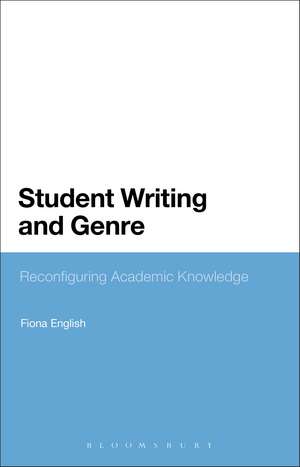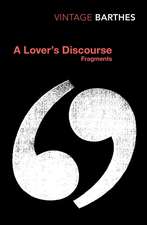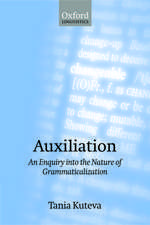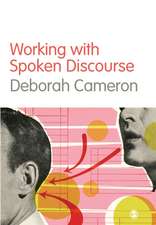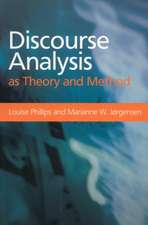Student Writing and Genre: Reconfiguring Academic Knowledge
Autor Fiona Englishen Limba Engleză Paperback – 21 noi 2012
| Toate formatele și edițiile | Preț | Express |
|---|---|---|
| Paperback (1) | 257.03 lei 6-8 săpt. | |
| Bloomsbury Publishing – 21 noi 2012 | 257.03 lei 6-8 săpt. | |
| Hardback (1) | 1007.45 lei 6-8 săpt. | |
| Bloomsbury Publishing – 13 apr 2011 | 1007.45 lei 6-8 săpt. |
Preț: 257.03 lei
Preț vechi: 330.94 lei
-22% Nou
Puncte Express: 386
Preț estimativ în valută:
49.18€ • 51.48$ • 40.94£
49.18€ • 51.48$ • 40.94£
Carte tipărită la comandă
Livrare economică 31 martie-14 aprilie
Preluare comenzi: 021 569.72.76
Specificații
ISBN-13: 9781441124708
ISBN-10: 1441124705
Pagini: 240
Dimensiuni: 156 x 234 x 13 mm
Greutate: 0.34 kg
Editura: Bloomsbury Publishing
Colecția Bloomsbury Academic
Locul publicării:London, United Kingdom
ISBN-10: 1441124705
Pagini: 240
Dimensiuni: 156 x 234 x 13 mm
Greutate: 0.34 kg
Editura: Bloomsbury Publishing
Colecția Bloomsbury Academic
Locul publicării:London, United Kingdom
Caracteristici
Offers a new theorisation of genre which changes the way in which we can talk about the relationship between knowledge, writing and learning
Notă biografică
Fiona English is a Visiting Fellow at the Centre for Multimodal Research, Department of Culture, Media and Communication, Institute of Education, University of London, UK.
Cuprins
1. Introduction 2. Shadow Writing 3. The Communicative Landscape 4. The Affordances of Genres 5. A Framework for Analysis 6. Repositioning the Writer 7. Reconfiguring Information 8. From 'Read' Experience to 'Lived' Experience 9. Genre as a Pedagogical ResourceBibliography Index
Recenzii
Student Writing and Genre: Reconfiguring Academic Knowledge is an engaging and theoretically sound book, which raises the question, 'how do genres affect the ways students understand and engage with their disciplines?'
Secondary English teachers who read Fiona English's (2011) Student Writing and Genre will marvel at the freedom she has, working in the university system, to devise assignment tasks that draw on the existing strengths and linguistic capabilities of her students. Frustrated by what she feels are the unnecessary limitations placed on undergraduates when they are constantly required to demonstrate knowledge in conventional essay form, she explores the transformation that takes place when they are encouraged to rewrite - to 're-genre' - their work in forms of their own choosing. Her book ... offers a fascinating opportunity to reflect on the nature of writing required of young people in classrooms and, more exactly, on the role of the critical essay and possible alternatives to its dominance.
This book made me want to be braver with the kind of assignments I set for student, despite the resistances they and I might have to 'unconventional' requirements ... We spend a lot of our lives working through student work so it is in their and our interests to create tasks which allow students to show what they can do and which make marking more pleasurable. This book is an invaluable resource in thinking through how to do that.
The book is very well written and provides a wide range of inspiring ideas and theoretical discussions substantiated by examples and analyses of students' writing. It can provide an invaluable resource for teachers across disciplines and in academic writing courses who attempt to create alternative forms of communication and interaction that allow active appropriation and construction of knowledge among their students.
Fiona English has written a book that is path-breaking, theoretically and practically. Authoritative and solidly based on the achievements of work in academic literacies, she treats genre as a flexible instrument for the shaping and re-shaping of writing and knowledge in the disciplines. The approach will have far-reaching, transformative effects both on the potentials of students' engagement with disciplinary knowledge and writing, as much as on practices of teaching in the different disciplines.
This is a cutting edge book which will make a major contribution to driving forward theoretical and pedagogical debates surrounding student writing, learning and assessment.
Secondary English teachers who read Fiona English's (2011) Student Writing and Genre will marvel at the freedom she has, working in the university system, to devise assignment tasks that draw on the existing strengths and linguistic capabilities of her students. Frustrated by what she feels are the unnecessary limitations placed on undergraduates when they are constantly required to demonstrate knowledge in conventional essay form, she explores the transformation that takes place when they are encouraged to rewrite - to 're-genre' - their work in forms of their own choosing. Her book ... offers a fascinating opportunity to reflect on the nature of writing required of young people in classrooms and, more exactly, on the role of the critical essay and possible alternatives to its dominance.
This book made me want to be braver with the kind of assignments I set for student, despite the resistances they and I might have to 'unconventional' requirements ... We spend a lot of our lives working through student work so it is in their and our interests to create tasks which allow students to show what they can do and which make marking more pleasurable. This book is an invaluable resource in thinking through how to do that.
The book is very well written and provides a wide range of inspiring ideas and theoretical discussions substantiated by examples and analyses of students' writing. It can provide an invaluable resource for teachers across disciplines and in academic writing courses who attempt to create alternative forms of communication and interaction that allow active appropriation and construction of knowledge among their students.
Fiona English has written a book that is path-breaking, theoretically and practically. Authoritative and solidly based on the achievements of work in academic literacies, she treats genre as a flexible instrument for the shaping and re-shaping of writing and knowledge in the disciplines. The approach will have far-reaching, transformative effects both on the potentials of students' engagement with disciplinary knowledge and writing, as much as on practices of teaching in the different disciplines.
This is a cutting edge book which will make a major contribution to driving forward theoretical and pedagogical debates surrounding student writing, learning and assessment.
